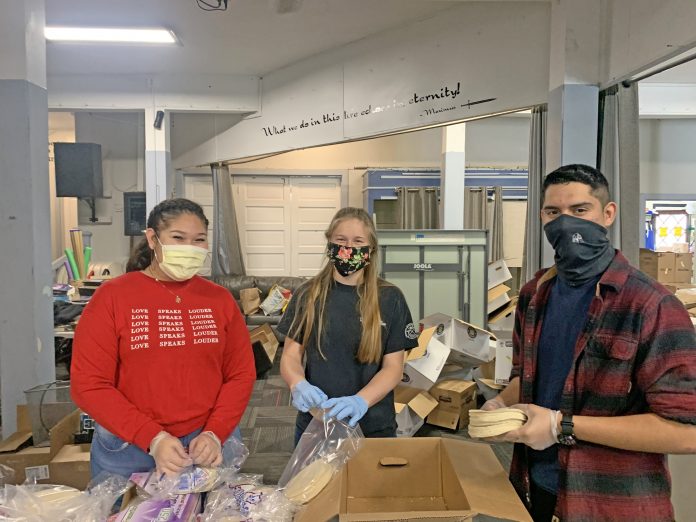
In COVID’s wake, Food Pantry meeting unprecedented need
It was something Nia Gerard never imagined she’d see: People who are normally gainfully employed and helping others now lining up to receive a free bag of food. One family’s story stood out.
“They’d run a successful business. They’d always helped others. Their love and generosity had always been monumental on the island,” Gerard recalled. “Now, they need help. They were so grateful when I handed them their groceries, they had tears in their eyes. It’s heart wrenching—really heart wrenching.”
For the past four years, Gerard has run Avalon Community Church’s Lord’s Pantry food program to assist low-income families and the homeless. Each Wednesday, the pantry is normally visited by just five to seven families. In the lean winter months when visitor count drops off, this increases to 10 to 12 families in need, Gerard explained. But in early March, she saw need swell and threaten to overwhelm the pantry.
“The need was unprecedented. That’s when I realized that this emergency was going to create a lasting hardship for many families on the island, and that we were in for a marathon,” she said.
Gerard’s instincts proved to be right.
With the throngs of visitors who normally begin their pilgrimage to Catalina Island each spring now staying away, times are tough for many islanders, like the family Gerard described, which works in the tourist trade or supports tourism. Unemployment among working island residents has already reached 80 to 90 percent, according to three local institutions.
Jim Luttjohann, president and CEO of the Catalina Island Chamber of Commerce and Visitor’s Bureau, described how, as the COVID-19 outbreak spread and travel restrictions went into effect, Avalon — visited by about 75,000 guests each March as a five-year average — morphed into a ghost town.
“We’re now seeing only bare-necessities travel, such as residents coming and going for medical appointments and other essential business,” Luttjohann said. “For all intents and purposes, we’re down to zero visitors.”
Earlier in the year, Gerard had started working with the city to help provide essential services beyond food for the homeless of Avalon. As it dawned on her that reinforcements for the pantry were most definitely needed, City of Avalon Community Services Director Dan Huncke called, as if on cue.
“I’d just gotten calls from the Island Company which was closing its restaurants, and Campus by the Sea that had a group of 280 cancel,” said Huncke. “Between these sources, we had a full three truckloads of food to distribute.”
“The timing was perfect,” Gerard exclaimed. “Even with the pallets of corn, beans and other staples Vons had been donating to the pantry, we couldn’t keep it stocked. The food was flying off the shelves!”
With his truckloads of food to sort and package, Huncke put out the word for help, and on short notice, 15 community volunteers came together. The Catalina Island Medical Center provided safety protocols for the large-scale effort. That day, March 20, the joint Church-City scale-up of the Pantry operation was born. In its first mass operation the group handed out 475 bags of groceries to a grateful 250 families. “It was really a tremendous operation,” Gerard described.
Recognizing that the threat of COVID-19 was here to stay, at least for some months, other Island charities reached out to the see how they could assist. The Catalina Island Foundation offered funding for the food security effort, and also, to pull together an Advisory Board to help integrate similar efforts such as Avalon School’s Free Lunch Program and the City’s Meals on Wheels.
“Our aim was to mobilize a group that could help support Dan, Nia, and every facet of the food security program, and also be prepared to support other community needs as the pandemic progresses,” said Cliff Hague, Catalina Island Foundation Co-Founder.
The resulting Avalon Food Security Advisory Group includes Avalon Rotary Club President Nicole Hohenstein; Avalon Community Church’s Reed Woodward; City of Avalon’s Jen Monroe, and Catalina Island Foundation Board Members Sue Rikalo and Cliff Hague, and the City’s Dan Huncke, with additional support from Mike and Linda Rivkin, both cofounders of the Catalina Island Foundation.
Early on, Avalon Lions Club purchased one hundred $25 gift cards to be used at local restaurants that were included in the grocery bags. The Blue Water Group donated 2,000 pounds of chicken they shipped over at their cost from their restaurants on the mainland. Cat Beverage stepped up to help navigate the maze of wholesale ordering and track down suppliers. Linda Rivkin created linkages with the Avalon School free-meals program and got the word out. Others organized neighborhood coordinators to pick up food and take it to those in need. A “Pay-it-Forward” flyer was developed to encourage volunteering post-COVID, and added to the food bags. A plan to add perishables like milk and eggs to the food bags was hatched, and Steve Hoefs volunteered to help with wholesale order processing and to use the “M” for cold storage.
For ongoing distributions, other organizations joined in to help, including the Avalon Rotary Club, teens from the Rotary Interact Club, and sponsored youth from the SCIF Scholarship Program. Weekly preparation takes up to 15 volunteers, with the Lion’s Club consistently filling five of those positions, Huncke said. The volunteers gather on Tuesdays at the Teen Center to sort, re-package bulk donations, and prepare bags of groceries to distribute to struggling families on Wednesdays, 11 a.m. to 2 p.m. at the Center.
Since not everyone can come pick up food, Huncke is among those who check on those in need to make sure they get food. One woman who is homebound left a message for Huncke that drove home the importance and impact of the various food security programs at this difficult moment for the Island community, and arguably, for the world.
“She was overwhelmed and in tears,” he described. “The help meant the world to her.”
Huncke and Gerard have been exceedingly grateful for the support. “There are so many moving pieces,” Huncke describes of the operation that is now producing supplemental grocery bags for 100 to 125 families each week, representing 300 to 400 individuals—close to 10 percent of the Island’s year-round population.
“How everyone has stepped in to help has been a Godsend,” added Gerard. “I don’t know how else we could be doing this. The outpouring of support has been nothing short of astonishing.”
Of course, worthy, large-scale efforts are made possible through the generosity of volunteer time, gifts-in-kind, and cash funding. The food security operation is costing an estimated $4,000 per week, Huncke said. At this writing, lead gifts have been made from the Catalina Island Foundation, Blanny Hagenah, the Catalina Yacht Club, the Tuna Club Foundation, The County of Los Angeles/Janice Hahn, and the Avalon Rotary Foundation.
Major gifts have also been received from Gary Johnson, the Rusack Family, Susan Marion, the Lion’s Club, and Ralph Larison. Major Gifts-in-Kind have been made by the Hoef’s Family, the Blue Water Group, Gary Johnson, the Catalina Island Company, Campus by the Sea, Greg Bombard and Vons.
Thanks, too, to “the dozens of other donors who’ve come forward to support the cause,” says Huncke who reports a total of more than $40,000 in donations so far. “The outpouring from the community has been incredible.”
Still, he says, there’s a need for additional funding—especially considering the uncertainty of how long travel restrictions will stay in place, and when they are lifted, how long it will be before visitors feel safe enough to venture back to the Island.
“We aren’t sure how quickly our tourism industry will bounce back, but we think it will be gradual and that many people won’t be back to work right away,” Huncke said. He and the Advisory Board anticipate needing to continue the food relief program for at least the next four months, Huncke said, adding, “we will adjust as need dictates.”
Considering what’s already been raised and spent, the fundraising goal for the balance of the effort is an additional $40,000, Huncke reported. “If you can afford $10 or $10,000, every contribution will make a difference and will be appreciated.”
“The need is there now, and some level of need will continue until this situation normalizes,” Huncke concluded. “Thanks to the generosity of the Avalon community and also, our supporters in Los Angeles County, we’ll be ready.”
A contribution to help fund the food security operation can be made at cityofavalon.com by navigating through the City’s “COVID-19” portal to the “Donate” button, or a tax-deductible donation can be made through avaloncommunitychurch.org, specifying the type as “Other” and “Food Pantry.”










